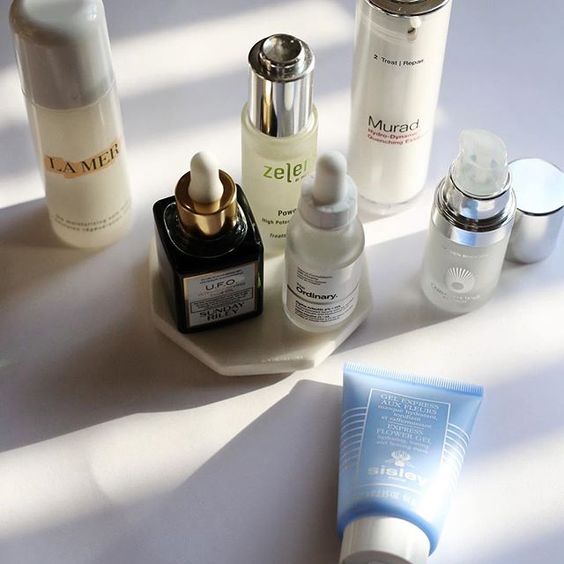Myths on Preservatives - Busted!
·

·
In an era where ”all-natural” products are becoming more and more common, you will come across lots of beauty companies touting “100% preservative-free” products. Sounds good, but is it too good to be true?

Science says yes. In reality, any water-based product that does not have preservatives present a breeding home for mold, fungus, bacteria, and yeast- especially when kept in humid environments such as the bathroom. If these bacteria are ingested through the nose, eyes, or mouth (eek!), this could pose a serious public health problem. That’s why all water-based products will need a certain quantity of preservatives to keep them germ-free and usable in the long-run.
Here are six things you need to know to safely navigate the world of preservatives in skincare:
1. The FDA does not allow the sale of products without preservatives
The Food, Drug & Cosmetic Act (FDA) of 1938 declared it illegal for cosmetic companies to sell products without a preservative. If you see any “preservative free” claims on skincare containing water (aqua), a red flag should immediately go off!

2. Oil-based products don’t require preservation in the same way
Oil-based products like balms, butters, and oils can use natural antioxidants such as tocopherol (vitamin E), grapefruit seed extract or rosemary oil extract to increase their shelf-life by preventing rancidity. These antioxidants are not effective in preventing microbial growth in water-based products.
3. “Preservative-free” products are a myth
Very few products can be “self-preserving” as they are difficult to formulate and manufacturers face lots of additional troubles such as keeping a constant check on the formula to make sure that it has not gone bad and still dealing with complains of “irritation”. According to a survey, most cosmetic companies reached a consensus that a preservative-free product would be difficult to maintain and would have to be treated as “fresh food”. It would have a small shelf life, would need to be refrigerated and replaced often. This would prove to be costly and inconvenient to customers, along with the risk of being unsafe. Customers would no longer feel motivated to buy these products as they would come with additional baggage and risks.
Is it worth all the trouble?

4. Parabens are not bad preservatives
Yes, read that again. Parabens got a bad rep due to some outdated research conducted with poor methodology and conclusions. Even though studies have consistently found that parabens do not have the negative effects initially presumed, many people still consider products with parabens as harmful. Despite much fear-mongering by “all natural” skincare fans, , no regulatory authority has made any attempt to limit the use of parabens in cosmetics or foods, due to their benefits and lack of adverse findings. All in all, while we at Primary do not use parabens in any of our products, science has shown that parabens are very effective and safe preservatives which do not cause health risks as originally believed.
5. Know your ingredients
If you’ve been following us for a while, you know we are big fans of knowing your ingredient labels. Here’s a list of harmful preservatives to look out for;
• Formaldehyde: Known to cause cancer, this preservative can cause damage to the brain, along with irritation, allergies, and asthma. While formaldehyde may not be listed on an ingredient list, there are several formaldehyde-releasing ingredients such as quaternium-15, DMDM hydantoin, imidazolidinyl urea, diazolidinyl urea, polyoxymethylene urea, sodium hydroxymethylglycinate, bromopol and glyoxal.
• Petroleum distillates: Some chemicals such as propylene glycol, polyethylene glycols, or polyoxyethylene.
• Phthalates: Are a group of chemicals that ensure that the product stays liquid and does not dry out. However, studies show that these chemicals cause asthma, ADHD, breast cancer and diabetes. They can be tricky to identify on the product packaging so a trick is to avoid products with “fragrance”. The term “fragrance” is often used to mask hundreds of different chemicals which manufacturers don’t have to legally disclose so we find it best to stay away from products labelled with “fragrance”!
• Triclosan: Also known as Microban, there is evidence that triclosan leads to the growth of “superbugs” that cannot be treated with antibiotics even. This chemical can weaken your immune system and cause hormonal imbalances in your body. It can build up in fat cells and be detected in urine, blood or breast milk over time.
6. Don’t let fear run your life
Unfortunately, the common perspective has been shaped by studies that do not provide sufficient evidence. Instead of focusing on real science, consumers have started to believe misleading slogans that they see on social media. Most skincare companies use a very small percentage of preservatives that is necessary to control microbial growth, without the risk of side effects. Make sure to always do your research before buying a product rather than making decisions based on misinformed marketing tactics! And remember, any product that reads as “preservative-free” is either dishonest or unsafe! Sometimes, companies fail to mention their real ingredients because they believe that customers want to use natural products. However, always look for products that mention their entire ingredient list so you can ensure that no toxic ingredients are being used on your skin.





Comments